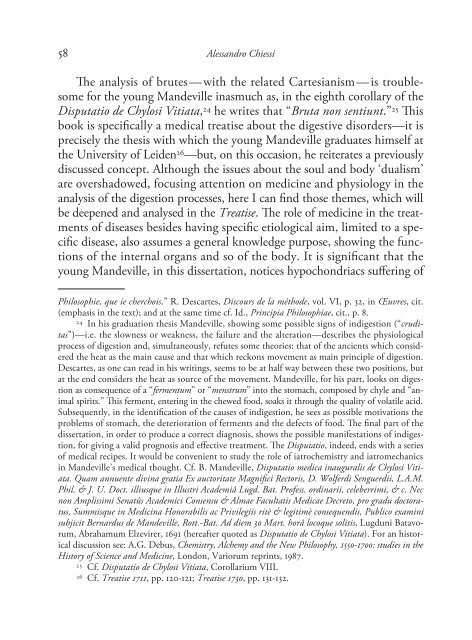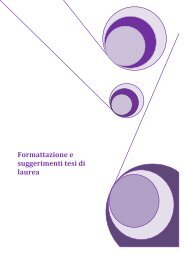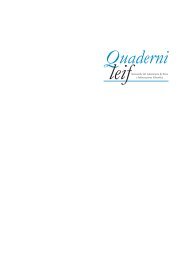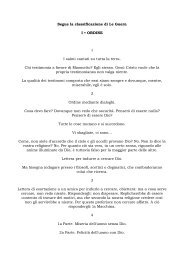qui - maria vita romeo
qui - maria vita romeo
qui - maria vita romeo
Create successful ePaper yourself
Turn your PDF publications into a flip-book with our unique Google optimized e-Paper software.
58 Alessandro Chiessi<br />
e analysis of brutes—with the related Cartesianism—is troublesome<br />
for the young Mandeville inasmuch as, in the eighth corollary of the<br />
Disputatio de Chylosi Vitiata, 24 he writes that “Bruta non sentiunt.” 25 is<br />
book is specifically a medical treatise about the digestive disorders—it is<br />
precisely the thesis with which the young Mandeville graduates himself at<br />
the University of Leiden 26 —but, on this occasion, he reiterates a previously<br />
discussed concept. Although the issues about the soul and body ‘dualism’<br />
are overshadowed, focusing attention on medicine and physiology in the<br />
analysis of the digestion processes, here I can find those themes, which will<br />
be deepened and analysed in the Treatise. e role of medicine in the treatments<br />
of diseases besides having specific etiological aim, limited to a specific<br />
disease, also assumes a general knowledge purpose, showing the functions<br />
of the internal organs and so of the body. It is significant that the<br />
young Mandeville, in this dissertation, notices hypo chondriacs suffering of<br />
Philosophie, que ie cherchois.” R. Descartes, Discours de la méthode, vol. VI, p. 32, in Œuvres, cit.<br />
(emphasis in the text); and at the same time cf. Id., Principia Philosophiae, cit., p. 8.<br />
24 In his graduation thesis Mandeville, showing some possible signs of indigestion (“crudi -<br />
tas”)—i.e. the slowness or weakness, the failure and the alteration—describes the physiological<br />
process of digestion and, simultaneously, refutes some theories: that of the ancients which considered<br />
the heat as the main cause and that which reckons movement as main principle of digestion.<br />
Descartes, as one can read in his writings, seems to be at half way between these two positions, but<br />
at the end considers the heat as source of the movement. Mandeville, for his part, looks on digestion<br />
as consequence of a “fermentum” or “menstrum” into the stomach, composed by chyle and “animal<br />
spirits.” is ferment, entering in the chewed food, soaks it through the quality of volatile acid.<br />
Subsequently, in the identification of the causes of indigestion, he sees as possible motivations the<br />
problems of stomach, the deterioration of ferments and the defects of food. e final part of the<br />
dissertation, in order to produce a correct diagnosis, shows the possible manifestations of indigestion,<br />
for giving a valid prognosis and effective treatment. e Disputatio, indeed, ends with a series<br />
of medical recipes. It would be convenient to study the role of iatrochemistry and iatromechanics<br />
in Mandeville’s medical thought. Cf. B. Mandeville, Disputatio medica inauguralis de Chylosi Vitiata.<br />
Quam annuente divina gratia Ex auctoritate Magnifici Rectoris, D. Wolferdi Senguerdii, L.A.M.<br />
Phil. & J. U. Doct. illiusque in Illustri Academiâ Lugd. Bat. Profess. ordinarii, celeberrimi, & c. Nec<br />
non Amplissimi Senatûs Academici Consensu & Almae Facultatis Medicae Decreto, pro gradu doctoratus,<br />
Summisque in Medicina Honorabilis ac Privilegiis ritè & legitimè consequendis, Publico examini<br />
subjicit Bernardus de Mandeville, Rott.-Bat. Ad diem 30 Mart. horâ locoque solitis, Lugduni Batavorum,<br />
Abrahamum Elzevirer, 1691 (hereafter quoted as Disputatio de Chylosi Vitiata). For an historical<br />
discussion see: A.G. Debus, Chemistry, Alchemy and the New Philosophy, 1550-1700: studies in the<br />
History of Science and Medicine, London, Variorum reprints, 1987.<br />
25 Cf. Disputatio de Chylosi Vitiata, Corollarium VIII.<br />
26 Cf. Treatise 1711, pp. 120-121; Treatise 1730, pp. 131-132.








